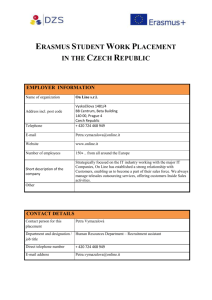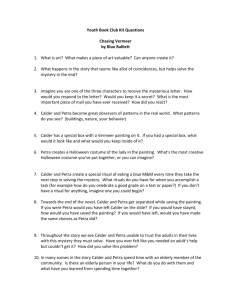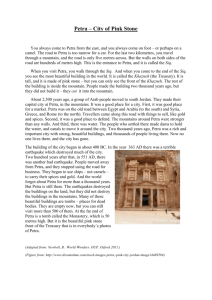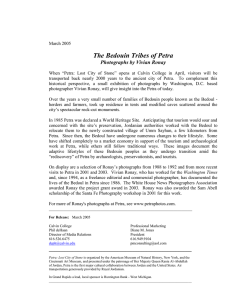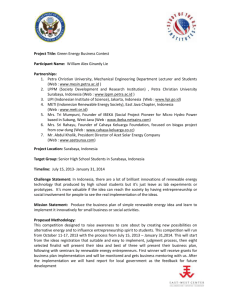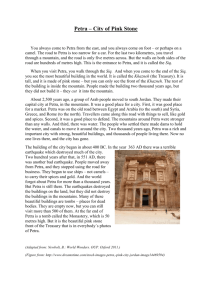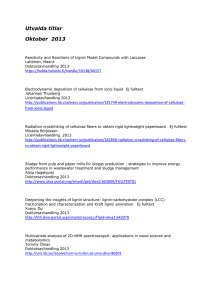Al-Khazneh
advertisement
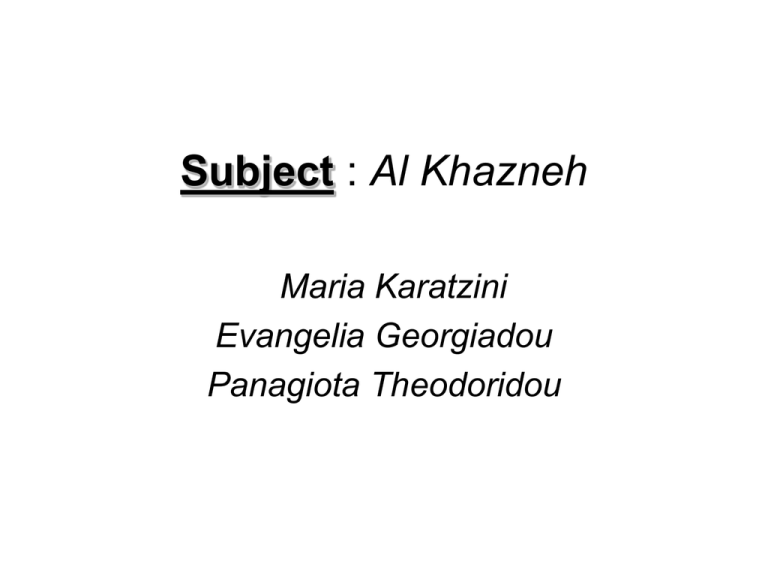
Subject : Al Khazneh Maria Karatzini Evangelia Georgiadou Panagiota Theodoridou Al-Khazneh Al-Khazneh is one of the most elaborate buildings in the ancient Jordanian city of Petra. As with most of the other buildings in this ancient town, including the Monastery (Arabic: Ad Deir), this structure was also carved out of a sandstone rock face. It has classical Greekinfluenced architecture, and it is a popular tourist attraction. History It is unknown as to why or exactly when Al Khazneh was originally built, probably between 100 BC and AD 200. Its Arabic name Treasury derives from one legend that bandits or pirates hid their loot in a stone urn high on the second level. Significant damage from bullets can be seen on the urn. Local lore attributes this to Bedouins, who are said to have shot at the urn in hopes of breaking it open and spilling out the "treasure" within (the decorative urn, however, is solid sandstone). Another is that it functioned as a treasury of the Egyptian Pharaoh of the time of Moses (Khaznet Far'oun). Another is that it functioned as a treasury of the Egyptian Pharaoh of the time of Moses (Khaznet Far'oun). Many of the building's architectural details have eroded away during the two thousand years since it was carved and sculpted from the cliff. The sculptures are thought to be those of various mythological figures associated with the afterlife. On top are figures of four eagles that would carry away the souls. The figures on the upper level are dancing Amazons with double-axes. The entrance is flanked by statues of the twins Castor and Pollux who lived partly on Olympus and partly in the underworld. There are burial chambers on either side of a ramp (enlarge image (right) to see) which were added in 1938. What to See The Treasury's façade has two levels, decorated with columns, classical rooflines and badly weathered sculptures. Perched atop the façade is an eagle, a Nabataean (and Greek) male deity symbol. The central figure on the upper level tholos may be the fertility goddess of Petra, El-Uzza (associated to the Egyptian goddess Isis). The vertical footholds on either side may have been made to aid the sculptors. The portal on the bottom level is reached by small flight of steps, and is flanked by mounted figures believed to be Castor and Pollux, sons of Zeus. Inside, a colossal doorway dominates the outer court and leads to an inner chamber of 12 square meters. At the back of the chamber is a sanctuary with an ablution basin (for ritual washing), suggesting that the Treasury was a temple or some other kind of holy place. The chamber can no longer be entered, but it is possible to look in from the doorway. What has become of it? Al Khazneh has been inhabited by many groups through the centuries and was in fact, uninhabited for many generations until a Swiss adventurer-scholar Johann Ludwig Burckhardt2 ‘rediscovered’ Petra on August 22, 1812. The site is one of the most beautiful of Petra, and is of course included in Petra’s designation as a “World Heritage Site,” so declared in 1985. The site hosts thousands of tourists from around the world. It has been featured in movies such as Indiana Jones and the Last Crusade as well as the move Spyhunter. Bibliography • http://www.allaboutarchaeology.org/alkhazneh.htm • http://en.wikipedia.org/wiki/Petra • http://www.sacreddestinations.com/jordan/petratreasury • http://epod.usra.edu/blog/2010/02/petr a-and-al-khazneh.html
